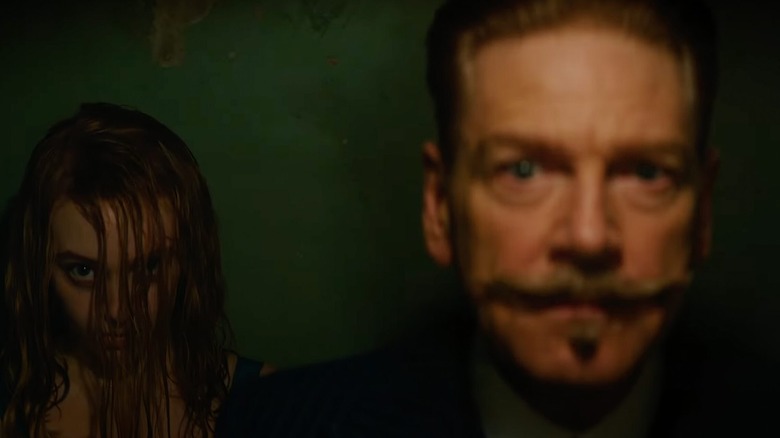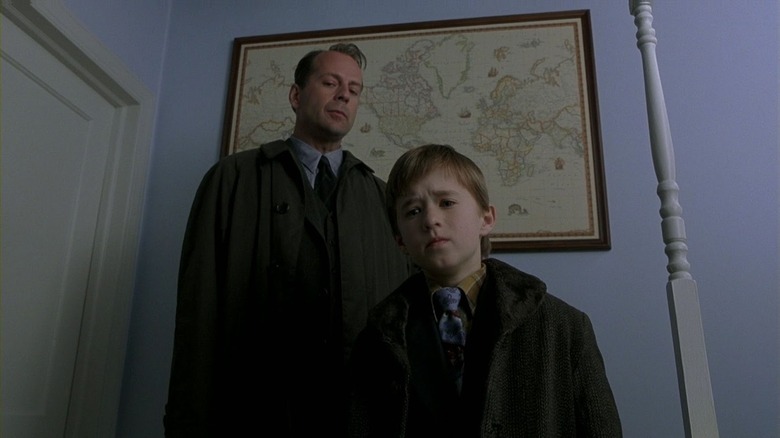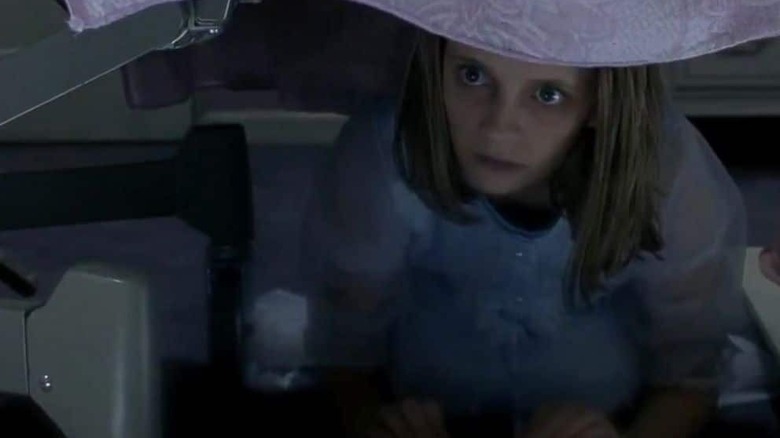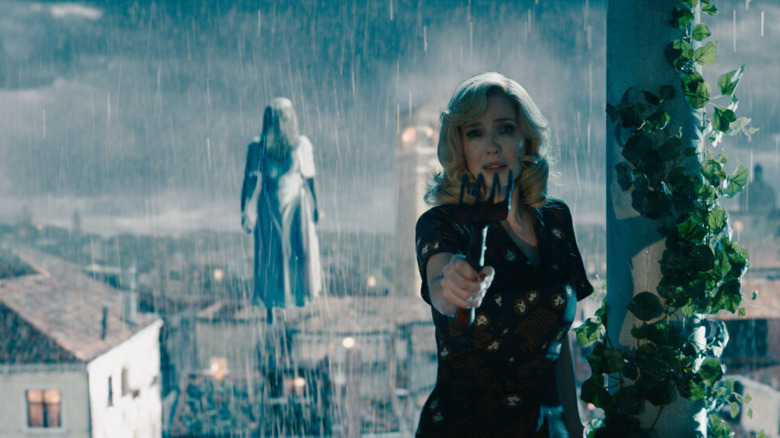A Haunting In Venice Shares More With The Sixth Sense Than Dead People
This article contains major spoilers for "A Haunting in Venice."
The murder mystery "whodunit" has very close ties to the horror genre; in fact, some may argue that murder mysteries deserve to be considered a part of the horror genre, full stop. It's splitting hairs, of course, but the question is one of tone and focus — most horror stories put a bigger emphasis on the act(s) of murder, while most mystery stories are about murder's after-effects.
"A Haunting in Venice" is the latest cinematic Agatha Christie adaptation by Kenneth Branagh in which he serves a dual role on both sides of the camera, as both director and actor portraying the central role of detective Hercule Poirot. Branagh's previous adaptations of Christie's Poirot mysteries, "Murder on the Orient Express" and "Death on the Nile," were films that fit neatly into the mystery genre and even, in a couple of instances, crossed over into the action genre.
"Venice," however, is intended to hew closer to horror, full of horror movie tropes. And not just any horror movie tropes, either, as "Venice" seeks to recall supernatural ghost story films. While it has something in common with a number of such movies, one in particular stands out: M. Night Shyamalan's "The Sixth Sense." "A Haunting in Venice" not only recalls "Sixth Sense" by involving ghosts, creepy children who can see them, and plot twists and turns. It also shares with Shyamalan's film a plot element that adds to the unsettling nature of both movies.
Seeing dead people
In "The Sixth Sense," Haley Joel Osment plays Cole Sear, a young boy plagued by the spirits of dead people, beings who are drawn to him thanks to his titular ability of perception. These poor souls don't know they're dead, and each of them has an unfulfilled duty or need that they must have help completing before they can move on to the afterlife. Through the help of child psychologist Malcolm Crowe (Bruce Willis), Cole learns to communicate with the dead and find ways to help them move on — especially and including Crowe himself, who turns out to be a ghost.
The idea of the spirits of the dead crying out for unfulfilled justice is a recurring trope in stories of the supernatural, and unsurprisingly it's all over "A Haunting in Venice." Branagh's Poirot has already been established as a man who cannot bear to allow misdeeds to go unsolved or unpunished, and so the murder of Alicia Drake (Rowan Robinson), as semi-accidental as it turns out to be, is insulting to both the detective and Alicia's wandering spirit. The palazzo in which the film takes place isn't just haunted by poor Alicia, either, as the building's history supposedly contains the ghosts of numerous children who were left there to die during the darkest days of the Black Plague.
The film also has its very own Cole Sear in the form of Leopold Ferrier (Jude Hill), a young boy of about the same age who is as much of a believer in the supernatural as he is precociously intelligent beyond his years. Hill even resembles a young Osment, no more so than when he's insisting to the skeptical Poirot that the spirits of the dead surround the palazzo.
The mis-adventures of barren Munchausen
The element that most strongly connects "The Sixth Sense" and "A Haunting in Venice" is also the darkest. In "Sixth Sense," one of the first spirits Cole is moved to help is the ghost of a girl named Kyra Collins (Mischa Barton), whom he first sees vomiting and sickly in a tent in his bedroom. Traveling to the girl's home where her funeral is taking place, Cole follows Kyra's spirit to discover a videotape under her bed. The tape inadvertently reveals that Kyra's mother (Angelica Page) had been keeping the girl sick, poisoning her food.
In "Venice," Poirot deduces that much of the supernatural occurrences he's been seeing around the palazzo stems from his being poisoned with the extract of a certain flower that used to grow on the rooftop garden, planted and curated by Alicia's mother, Rowena Drake (Kelly Reilly). Rowena had been using the poison on Alicia in much the same fashion as Kyra's mother, adding controlled amounts of it to her meals. When the family housekeeper, Olga (Camille Cottin), accidentally gave Alicia too much of the poison (believing it to be honey), the girl died in her sleep, and Rowena decided to stage her suicide, setting the events of the film in motion.
This vile form of child abuse is close to the real-life mental illness known as Munchausen Syndrome by Proxy, an offshoot of Munchausen Syndrome (where the afflicted acts as if they have another illness when they really do not). In Munchausen by Proxy, a caregiver either fakes their child's illness or instigates it. While Mrs. Collins' actions in "Sixth Sense" closely approximate this disorder (as the woman seems to be benefiting from the attention given to her), Rowena Drake in "Venice" has different motivations, as she seeks to keep Alicia close to her forever.
A twisted kind of love
In "The Sixth Sense," many of the ghosts Cole sees and interacts with are lingering in limbo out of some form of love. This is especially true in Malcolm's case — he cannot understand why his wife, Anna (Olivia Williams) is so cold and distant toward him until he finally realizes it's because he's passed on. Even in Kyra's case, there's a sense that her mother did what she did out of some twisted form of love.
Twisted love is swiftly emerging as a major theme of Branagh's Poirot pictures. In "Murder on the Orient Express," the murderers of Edward Ratchett (Johnny Depp) committed their crime in revenge for what the gangster did to the young child of their friend, and in "Death on the Nile," Linnet Ridgeway-Doyle (Gal Gadot) is killed for being the odd woman out in a passionate love triangle. Although the murders that take place in the story's real-time occur due to Rowena seeking to cover her tracks, the murder of Alicia in "Venice" is also the result of twisted love.
"The Sixth Sense" and "A Haunting in Venice" are mystery films in their own unique ways, with their protagonists getting to the bottom of their issues and bringing the guilty to justice. As horror films, however, they're remarkably similar, proving that the ultimate mystery — and sometimes, the ultimate horror — is the human heart.



